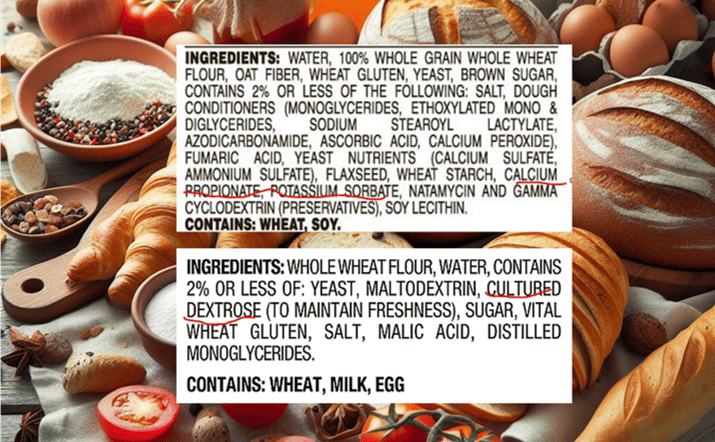
Why are there always more than one preservative in bread and tortillas?
The combined use of artificial preservatives may not be related to synergy, but rather to meet requirements of regulatory limits. Learn more about how cultured dextrose can help address the situation.


Calcium propionate, sorbic acid, and benzoic acid (or their salts ) are the main artificial antimicrobial agents used in baked goods. Calcium propionate is the most widely used one, it can work alone, but most often teams up with sorbic or benzoic acid in commercial sliced bread and tortillas. Some people believe that the combination of agents has a synergetic antimicrobial effect. Is this the true reason for using them together?
Most active at pH below 5.5, calcium propionate is well-suited for preserving bread and tortillas, and requires lower concentrations than sodium propionate for mold inhibition (1). Sorbic acid, with a pKa of 4.76, has a similar working pH range, while benzoic acid, the strongest acid among the three, is optimal for food with a pH between 2 to 4.5.
Despite the belief in synergistic antimicrobial effects, there is not much scientific evidence supporting the combination. One the contrary, two studies (2,3 ), the combined treatment of sorbate and benzoate did not show any synergistic effect against some bacteria and molds/fungi (it did when combined with sodium nitrite). Because they are all synthetic chemicals, their application in baked goods is subject to regulatory usage limits. Even at the highest permissible dose (0.3% for sliced bread), standalone calcium propionate may fall short in ensuring the shelf life required for mass-produced and intensively distributed baked goods. Since antimicrobial agents follow a linear dose-response curve, the combination becomes necessary for longer shelf-life without breaching the legal limits (0.2% for sorbic acid and 0.1% for benzoic acid in baked goods).
While all three acids occur naturally, only propionic acid (and its salts) can be commercially produced in ways deemed "natural". Naturally produced propionate salts are one of key active ingredients identified in the emerging cultured dextrose or wheat products. Following the clean-label trend, more and more bread and tortilla bakers, including some major players, have begun to replace those artificial preservatives with cultured dextrose/wheat.
Cultured dextrose or wheat are vague terms that do not reveal their ingredients, but they are approved by the industry like stevia leaf extract or natural flavors. Sometimes, they are also called fermented dextrose/wheat. They are made by fermenting materials rich in dextrose or wheat flour with natural bacteria. The main active ingredients vary depending on the bacteria used, it can be ethanol, short chain organic acids, or something more complex. The most desired propionate, chemically identical to the synthetic form, is only found in cultured dextrose/wheat made by propionic acid bacteria (PAB). Due to technical challenges, propionate contents in commercial products varies significantly, generally ranging between 10% to 50%, with cultured wheat usually having lower levels and higher production costs than cultured dextrose. The large product variation emphasizes that cost-in-use, not cost per pound (kilogram), is the key factor when deciding which product is most economic.
Unlike synthetic calcium propionate, cultured dextrose/wheat does not have a regulatory usage limit, allowing bakers to use them in higher doses for prolonged shelf life. Whole Food Markets bans propionate, benzoate and sorbate from all food they sell, but allows cultured dextrose.
The rise of cultured dextrose/wheat signifies a clean-label approach for health-conscious bakers to extend shelf life by using a single natural ingredient. Please feel free to get in touch with us at info@sunsonbiotech.com if you need any support or guidance with your clean label needs. Free high purity cultured dextrose samples are available to request.
References
1: L.D. Kagliwal, et al, in Encyclopedia of Food Microbiology (Second Edition), 2014
2: D. Stanojevic, et al: Antimicrobial effects of sodium benzoate, sodium nitrite and potassium sorbate and their synergistic action in vitro, Bulgarian Journal of Agricultural Science, 2009,15, 307-311
3: Y.Y. Yang, et al: Combination Effects of Potassium Sorbate and Sodium Benzoate with Sodium Chloride on the Growth of Bacillus subtilis, Korean Journal of Food Science and Technology, 1988, 20, 23-27

